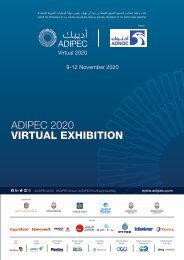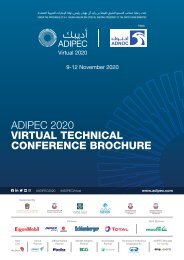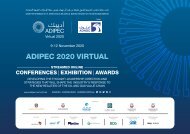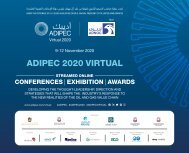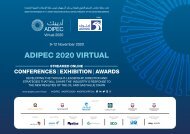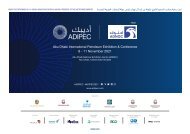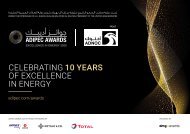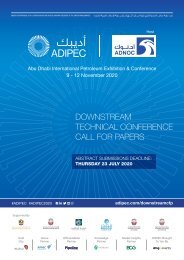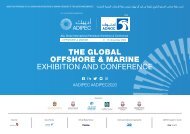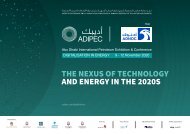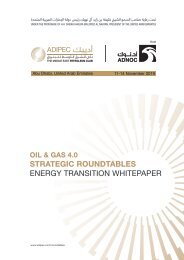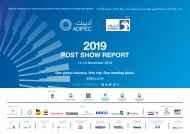CFP Brochure 2020
Create successful ePaper yourself
Turn your PDF publications into a flip-book with our unique Google optimized e-Paper software.
9-12 NOVEMBER <strong>2020</strong><br />
Abu Dhabi National Exhibition Centre - Abu Dhabi, UAE<br />
ADIPEC <strong>2020</strong><br />
TECHNICAL CONFERENCE<br />
CALL FOR PAPERS<br />
FINAL DEADLINE: SATURDAY 25 APRIL <strong>2020</strong><br />
www.adipec.com/cfp<br />
Supported by<br />
Venue Partner<br />
ADIPEC Host City Official Media Partner Technical Conference<br />
Organised By<br />
ADIPEC Brought<br />
To You By
#ADIPEC #ADIPEC <strong>2020</strong><br />
ADIPEC 2019<br />
Technical Sessions<br />
In Numbers<br />
684<br />
Submitting Companies From 67 Countries<br />
Resulted In 123 Technical Sessions<br />
123<br />
Technical Conference Sessions<br />
3,653<br />
Abstract Submissions<br />
6<br />
Technical Panel Sessions<br />
860<br />
Abstracts Selected (492 Technical And 368 Eposter)<br />
From 224 Companies And 48 Countries<br />
Delegate Survey<br />
Responses<br />
97% 92% 85% 97%<br />
Said the value received from<br />
the conferences exceeded<br />
the value of the time invested<br />
2<br />
Met their objectives<br />
by attending the<br />
conferences<br />
Said they would<br />
return in <strong>2020</strong><br />
Would recommend the<br />
ADIPEC Conferences<br />
Source: ADIPEC 2019 Conference Delegate Survey
155,000 +<br />
2,200 +<br />
ADIPEC.COM<br />
An excellent opportunity to<br />
network at the world’s premier<br />
exhibition and conference<br />
ENERGY PROFESSIONALS<br />
EXHIBITING COMPANIES<br />
160,000<br />
11,000 + *<br />
GROSS SQM<br />
CONFERENCE DELEGATES<br />
25<br />
1,000 +<br />
EXHIBITING COUNTRY PAVILIONS<br />
EXPERT SPEAKERS<br />
51<br />
161<br />
NATIONAL AND INTERNATIONAL OIL COMPANIES<br />
CONFERENCE SESSIONS<br />
* Based on unique and repeat delegates to all conference sessions<br />
3
#ADIPEC #ADIPEC <strong>2020</strong><br />
An overview of the<br />
ADIPEC <strong>2020</strong> conferences<br />
1 3 2<br />
11<br />
ADIPEC Official Opening<br />
Ceremony*<br />
Keynote<br />
Addresses<br />
Ministerial<br />
Sessions*<br />
Global Business<br />
Leaders Sessions<br />
Celebrating the opening of<br />
ADIPEC with featured and<br />
keynote speakers<br />
An insight into the<br />
understanding of key topics that<br />
are disrupting economics, the<br />
energy landscape, megatrends,<br />
and industry dynamics<br />
Inspiring new manifestos to<br />
accelerate oil and gas growth<br />
Global Business Leaders and<br />
Industry representatives, come<br />
together to discuss new and<br />
emerging mega trends and the<br />
world’s growing energy demand<br />
2 6 7<br />
123<br />
Finance Global Business<br />
Leaders Sessions<br />
Oil & Gas 4.0 Strategic<br />
Roundtables<br />
LIVE<br />
Sessions<br />
Technical Conference<br />
Sessions**<br />
Financing the future growth<br />
of today’s global oil and gas<br />
industry<br />
a series of exclusive, closeddoor<br />
discussions addressing key<br />
industry trends within the context<br />
of Oil & Gas 4.0<br />
An exclusive question and<br />
answer format with leading global<br />
global influencers and disruptors<br />
transforming the global economic<br />
and energy landscape<br />
Subject-matter experts will share<br />
practical and applied knowledge<br />
on technology ranging from<br />
exploration to development and<br />
production of resources<br />
6<br />
10<br />
6<br />
Technical Panel<br />
Sessions**<br />
Downstream Technical<br />
Conference Sessions*<br />
Inclusion & Diversity in<br />
Energy Sessions*<br />
Industry experts will provide<br />
technical insights on key issues<br />
shaping the oil and gas industry<br />
Technical experts provide<br />
insights into refining and<br />
petrochemical technology,<br />
innovation project updates and<br />
integration and collaboration<br />
across the value chain<br />
Fostering diverse and inclusive<br />
oil and gas workplaces<br />
FOR CONFERENCE ENQUIRIES<br />
adipec.delegate@dmgevents.com<br />
www.adipec.com/conferences<br />
4<br />
*Organised by<br />
**Technical conference organised by
ADIPEC.COM<br />
Speaking at ADIPEC<br />
BE PART OF<br />
A GLOBAL<br />
SPEAKERS<br />
LINEUP<br />
The Abu Dhabi International Petroleum Exhibition and Conference (ADIPEC) remains the world’s premier event for sharing<br />
professional knowledge and shaping the strategic future of oil and gas industry. Attended by more than 11,000 delegates and over<br />
1,000 speakers from across the globe the conference enables high-level networking and interaction, stimulating intellectual, open<br />
and meaningful dialogues. ADIPEC conferences brings together Energy Ministers, Global CEOs and leading decision makers across<br />
four days of focused business, partnerships and knowledge transfer that addresses today’s energy needs and define tomorrow’s<br />
energy landscape.<br />
The ADIPEC Technical Conference, organised by the Society of Petroleum Engineers (SPE), is a multi-disciplinary conference that<br />
caters to today’s modern engineers, providing them with an opportunity to learn, meet and network with fellow engineers working in<br />
different oil and gas producing environments, with different challenges, from around the world.<br />
With the Call for Papers still open for submissions, technical professionals have the opportunity to submit before 25 April <strong>2020</strong>, to be<br />
considered for the ADIPEC <strong>2020</strong> Technical Conference. ADIPEC is a testament to the rising demand for knowledge exchange in the<br />
Middle East, Africa & Asian Sub-Continent in our ever changing energy world.<br />
Important dates<br />
30<br />
January<br />
Call for Papers<br />
Deadline<br />
18<br />
May<br />
ADIPEC <strong>2020</strong><br />
Call for Papers Open<br />
Author Notifications<br />
25<br />
April<br />
9 - 12<br />
November<br />
Submit your abstract online<br />
www.adipec.com/cfp<br />
Final deadline:<br />
Saturday 25 April <strong>2020</strong><br />
5
#ADIPEC #ADIPEC <strong>2020</strong><br />
Why Submit Abstracts?<br />
As an oil and gas expert, you have the<br />
opportunity to join over 1,000 technical<br />
speakers from around the world addressing<br />
the industry’s most topical issues and<br />
presenting technological advances to<br />
industry peers. The ADIPEC technical<br />
conference, organised by SPE, is the place<br />
to hone your knowledge and share best<br />
practices with your industry colleagues.<br />
With over 100 technical conference<br />
sessions and more than 11,000 delegates<br />
in attendance, the ADIPEC Technical<br />
Conference is a testament to the rising<br />
demand for knowledge exchange in the<br />
Middle East, Africa & Asian sub-continent in<br />
our ever-changing energy world.<br />
ADIPEC is host to the world’s largest and most important<br />
technical conferences with over 123 sessions and 1,000+<br />
speakers in 2019.<br />
Present your technical knowledge and experience to an<br />
international audience of industry colleagues.<br />
Raise your company’s technical profile at a prestigious energy<br />
event.<br />
As a distinguished speaker at ADIPEC, the opportunity to<br />
network extends beyond the conference programme, with over<br />
2,200 exhibiting companies on the show floor with whom you<br />
can interact and meet.<br />
Network with over 155,000 industry professionals from 167<br />
countries.<br />
Technical Categories For <strong>2020</strong> Paper Proposals<br />
• Oil And Gas 4.0: A Journey to Adapt the Future of Oil & Gas<br />
Industry, Aiming to Grand Master the Next Generation of<br />
Improved Operations and Technologies<br />
• Sustainable Solutions For The Oil And Gas Industry<br />
• Project Management<br />
• People Development And Diversity<br />
• Health And Safety<br />
• Geosciences<br />
• Oil Field Development And Management<br />
• Gas Field Development And Management<br />
• Unconventional Resources Development<br />
• Supply Chain Management<br />
• Marine Logistics And Operations<br />
• Drilling Operations<br />
• Well Completions<br />
• Operational Excellence<br />
• Production Facilities<br />
• Enhanced Oil Recovery<br />
Submit Your Abstracts Before Saturday 25 April <strong>2020</strong><br />
Submit your abstract online www.adipec.com/cfp<br />
6
ADIPEC.COM<br />
Technical Categories For Paper Proposals<br />
1. OIL AND GAS 4.0: A Journey<br />
to Adapt the Future of Oil & Gas<br />
Industry, Aiming to Grand Master<br />
the Next Generation of Improved<br />
Operations and Technologies<br />
1. Data Acquisition, Control, and Monitoring Systems<br />
2. Data Availability, Integrity, and Access<br />
3. Data Management and Security<br />
4. Field Automation including Instrumentation<br />
and Control<br />
5. Industrial Internet of Things (IIOT) applied to Oil<br />
and Gas Fields<br />
6. Hardware and Software Choices and Support for<br />
Various Needs<br />
7. Artificial Intelligence, Robotics and Expert Systems<br />
8. Big Data Applications<br />
9. Integration and Visualization Technologies<br />
10. Knowledge Capture and Management<br />
11. Engineering workflow and<br />
business process automation<br />
12. Cognitive Prescriptive Applications Geoscience,<br />
Reservoir and Production Management<br />
13. Cognitive Prescriptive Applications in<br />
Drilling event detection and prevention<br />
14. Oil and Gas 4.0 Innovative use cases<br />
and applied technologies<br />
15. Automation of Routine Workflows,<br />
with Cognitive Exception Based Reporting<br />
16. Integrity Opportunities and Challenges<br />
in a Digital World<br />
17. Robots to Replace Human Beings in the Oilfield<br />
or Smart Addition?<br />
18. The Big Data picture Across Disciplines.<br />
Where is the Value?<br />
19. Why do we need Cloud computing in the O&G?<br />
2. PEOPLE DEVELOPMENT AND<br />
DIVERSITY<br />
20. Gender Balance<br />
21. Human Capital and Talent Management<br />
22. Organizational Development<br />
23. What does a Future Leader Need to Know?<br />
24. Leadership Development And Empowerment<br />
25. Empowerment Strategies for Key Workforce<br />
Segments (Age, Gender, Race)<br />
26. Building the Next Generation of Petro<br />
Technical Professionals<br />
27. Leadership Development and Succession<br />
Management<br />
28. The Value of Diversity as a Workforce Strategy<br />
29. Managing Change through Effective<br />
Knowledge Management<br />
30. Developing Capability for a Continuous<br />
Improvement Culture<br />
31. Competency and Professionalism in<br />
a Changing Industry<br />
32. Cost Effective Training and Development<br />
33. Maximising Values of International Companies<br />
collaboration with the National Companies<br />
34. Effective Nationalisation Strategies<br />
35. Developing an Agile Workforce<br />
36. Effective Knowledge Management Strategies<br />
37. Talent Acquisition Strategies<br />
38. Instilling Work Ethics in the Workplace<br />
39. Workforce Engagement Strategies<br />
40. Do We Need to Change Our Recruiting<br />
Habits in the O&G?<br />
41. How Does the Next Generation of AI, Software<br />
and Robotic Human Capital Fit Into Our<br />
42. Traditional Engineering Community?<br />
3. HEALTH AND SAFETY<br />
43. Organizational Behaviour<br />
44. Minimising Environmental Footprint<br />
45. New Approaches for Environmental Impact<br />
Assessment and Management<br />
46. Human Factors in HSE Performance<br />
47. Promoting Safety Culture: Change in Mindset<br />
48. Effective Concepts for Occupational<br />
Health Management<br />
49. Managing the Asset Integrity Risks Associated with<br />
CO2, H2S and High BWS (Wells and Facilities)<br />
50. Integrating Asset Integrity and HSE Management<br />
51. Accident Prevention and “Lessons Learned” in<br />
Safety (Onshore & Offshore)<br />
52. Best Practices in Gas Flaring<br />
and Emission Reduction<br />
53. Major Accidents Prevention and Lessons Learnt<br />
54. Innovation in Environmental Protection<br />
55. AI Technologies for Human and Asset Protection<br />
in O&G Fields<br />
56. Minimizing Hazardous Waste in O&G<br />
Field Operations<br />
4. GEOSCIENCES<br />
57. Advances in Regional Geology (Sedimentology,<br />
Sequence and Bio-Stratigraphy, Basin and<br />
Structural Modelling etc.)<br />
58. New Exploration Plays (Subtle Traps, Deep Plays,<br />
Field Satellite Extensions)<br />
59. Rock Physics and Geomechanics for<br />
Conventional Reservoirs<br />
60. Seismic Inversion in Reservoir Modelling<br />
61. Advances in Reservoir Characterisation (SCAL,<br />
RRT, Core Integration, PNM, Digital Rock Physics)<br />
7
#ADIPEC #ADIPEC <strong>2020</strong><br />
102. Data-Driven Analytics; Applications in<br />
Reservoir Engineering<br />
103. Data-Driven Analytics; Applications in Reservoir<br />
Modeling and Reservoir Management<br />
104. PVT-Fluid Properties/Sampling<br />
105. Downhole Sensing, Flow Monitoring and Control<br />
106. Advances in Matrix Acidizing of Carbonate<br />
Reservoirs<br />
107. Crude Price Analysis and Reserves Classification<br />
108. Improving Field Performance through Effective<br />
Reservoir Surveillance<br />
109. Artificial Lift Technology and Applications<br />
110. Matured Field Re-Development and Challenges<br />
111. Advances in Rigless Well Intervention<br />
112. Marginal Field Developments and Optimisations<br />
113. Integrated Asset Optimisation for Offshore Fields<br />
62. Faults and Fracture Characterisation, Fault Seal<br />
Analysis/DFN Modelling<br />
63. Advancement in Real-Time Formation Evaluation<br />
Case Studies (Geosteering, Logging Tool Selection,<br />
Interpretation)<br />
64. Making Better Decisions: Role of Geoscience in<br />
Uncertainty Assessment and Risk Management<br />
65. Tight Reservoirs, Fracture Characterisation<br />
and Modelling<br />
66. Advances in Reservoir Characterisation<br />
67. Integration of Magnetic Resonance (CMR/<br />
NMR) Logs, MICP, SCAL, CCA Data in Defining<br />
Carbonate Petrophysical Rock Typing<br />
68. Is Brute Force Computing an Answer to Model<br />
Complex Reservoirs?<br />
69. New Approaches in Characterisation and Modelling<br />
of Complex Reservoirs<br />
70. Geostatistics and Static Modelling<br />
71. Basin Analysis and Modelling; Source to Migration<br />
to Trapment<br />
72. Data-Driven Analytics; Applications in G&G<br />
73. Examples of New Technology Application in<br />
Exploration, Case Studies<br />
74. R&D: Geoscience Technology Development<br />
and Deployment<br />
75. Advances in Dynamic Formation Evaluation<br />
76. 4D Seismic in Carbonate Reservoir–Challenges<br />
and Opportunities<br />
77. Cased Hole Logging Technology<br />
78. Petrophysics of Naturally-Fractured Reservoirs<br />
79. Dynamic Formation Evaluation<br />
80. Emerging Logging Technologies and<br />
Interpretation Methods<br />
81. Induced Fracture Modeling: How Good are We?<br />
5. OIL FIELD DEVELOPMENT<br />
AND MANAGEMENT<br />
82. Challenges of Field Development Plan for<br />
Reservoirs under Depletion Mode<br />
83. Challenging Developments: Oil Rims, Marginal<br />
Fields, Complex Reservoirs, Paleo Oil<br />
84. Development Plan Optimisation of the Reserves<br />
and Project Economics<br />
85. Integrated Asset Modelling for Oil Reservoirs:<br />
Coupling Surface Facilities with Reservoir Models<br />
86. Challenges of Gas Injection and Production/<br />
Process Optimisation<br />
87. Maximising Value from Mature Fields Revitalisation,<br />
Redevelopment, and End of Field Life Planning<br />
88. Advances in Water flooding Management<br />
(Capturing Learnings from Mature Reservoirs)<br />
89. Achieving Exceptional Recovery-Case Studies<br />
90. Getting the Most from Reservoir Surveillance, Well<br />
Testing, Production Measurement<br />
91. Maximising Production-Downtime Management<br />
and Well Utilisation<br />
92. Reservoir Modelling, Simulation, and History Matching<br />
93. Fluid Characterisation, SCAL, and Fluid-Rock<br />
Interaction<br />
94. History Matching–Best Practice<br />
95. Complex Well Modelling<br />
96. Field Development–Uncertainty Analysis<br />
97. New Generation Simulators<br />
98. Workflow for Mature Oil Fields<br />
99. Well Testing and Production Logging (Fractured<br />
Reservoirs with Horizontal Wells)<br />
100. Extending the Economic Life of Mature Fields<br />
101. Innovative Development Solution for Marginal<br />
Fields and Reservoirs<br />
6. GAS FIELD DEVELOPMENT<br />
AND MANAGEMENT<br />
114. Gas Field Developments and Optimizations<br />
115. Gas Properties/Sampling<br />
116. Integrated Asset Modelling for Gas Reservoirs:<br />
Coupling Surface and Subsurface Models<br />
117. Gas Storage, Recycling and Production/Process<br />
Optimisation<br />
118. Recent Developments in Gas Processing<br />
119. Challenges Related to Production of Sour Gas<br />
from HP/HT Reservoirs<br />
120. LPG, Chemical Gas, CNG & LNG Production<br />
Challenges<br />
121. Carbon Capture and Storage Technology–Can<br />
CO2 be Overcome Positively?<br />
122. Advances in Gas Sweetening and Dehydration<br />
123. Efficient Utilisation of Energy in Gas Processing<br />
124. Improvements and Advances in Sour Gas<br />
Processing<br />
125. Improving Compressors/Drivers Availability<br />
126. Advances in Centrifugal Gas Compressors<br />
127. Metering and Instrumentation (Flow<br />
Measurement, Gas Quality Measurement,<br />
Technologies)<br />
7. UNCONVENTIONAL<br />
RESOURCES DEVELOPMENT<br />
128. Green Fluids for Hydraulic Fracturing<br />
129. Progress in Frac Fluid Recycling<br />
130. Fracking Techniques and Compartmentalisation<br />
131. An Opportunity for the Middle East?<br />
132. Unconventional Gas Exploration and Appraisal in<br />
the Middle East<br />
133. Unconventional Resource Assessment: Methods<br />
to Estimate Gas Volumes in Place and Ultimate<br />
134. Recovery<br />
135. Geomechanics, Horizontal Drilling and Hydraulic<br />
Fracturing in Shale Gas Plays<br />
136. Unconventional Oil Exploration and Appraisal in<br />
the Middle East<br />
137. Advances in Understanding of Shale Gas<br />
Transport, Recovery Enhancement, and<br />
Simulation Modelling<br />
138. Geological and Geophysical Characterisation<br />
139. Petrophysical Characterisation<br />
8
ADIPEC.COM<br />
140. Geomechanics<br />
141. Reservoir Modelling<br />
142. Horizontal Well Placement<br />
143. Fracturing Performance<br />
144. Technical and Operational Challenges of Tight<br />
Gas and Oil and Shale Gas and Oil<br />
8. ENHANCED OIL RECOVERY<br />
145. Chemical Flooding<br />
146. CO2 Injection<br />
147. Gas Injection<br />
148. Solvents Injection<br />
149. Microbial Methods<br />
150. Thermal EOR applications<br />
151. Nano Particles EOR applications<br />
152. Low Salinity EOR applications<br />
153. EOR Modeling Advancements<br />
154. Pilots Design and Workflow<br />
155. EOR Monitoring and Surveillance<br />
156. Fast Tracking Approach<br />
157. Field Scale Implementation<br />
158. EOR Surface Facilities<br />
159. Flow Assurance and Integrity<br />
160. New Technologies and Research<br />
and Development<br />
9. SUSTAINABLE SOLUTIONS FOR<br />
THE OIL AND GAS INDUSTRY<br />
161. Decreasing Fresh Water Usage<br />
162. Water Recycling<br />
163. CO2 Capture, Usage And Sequestration<br />
164. Use Of Recycling Oil<br />
165. Reducing Gas Emission<br />
166. Downstream Energy Efficiency<br />
167. Reducing Methane Leakage<br />
168. Engineering Design for Optimum Energy<br />
Conservation (Efficient Energy Use and Reduced<br />
169. Reliance on Conventional Sources)<br />
170. E&P Data Management Excellence<br />
171. Upstream Social Responsibility<br />
172. Cooperative Alternatives Energies<br />
10. PROJECT MANAGEMENT<br />
173. Engineering, Procurement, Construction,<br />
Management: Strategies for Successful Project<br />
Execution<br />
174. Challenges of Gas and Oil Mega-Projects:<br />
Resource, People, Management, Delivery and<br />
Cost Perspectives<br />
175. Mitigating Challenges during Commissioning and<br />
Start-Up of Gas and Oil Projects<br />
176. Realising Strategic/Economic Benefits of<br />
Standardisation<br />
177. Brownfield Project Challenges, Interfaces, Risks,<br />
and Mitigations<br />
178. Realising Opportunities of Smart Field<br />
Technology/Automation<br />
179. Latest on Project Management Tools<br />
180. Best Practices in Well Delivery; From Concept<br />
to Production<br />
11. SUPPLY CHAIN MANAGEMENT<br />
181. Material Management<br />
182. Integrated Supply Chain Management<br />
12. MARINE LOGISTICS AND<br />
OPERATIONS<br />
183. Emerging and Advanced Technologies<br />
184. Offshore Vessels and Platforms<br />
185. Materials Performance<br />
186. Infrastructure, Logistics and Supply Chain<br />
187. Offshore Artificial Islands & Coastal Engineering<br />
188. Offshore Projects and case studies<br />
189. Offshore Structural Engineering<br />
190. Subsea pipelines, Umbilical and IRM<br />
191. Diving, Survey and ROVs Technologies<br />
192. Marine Engineering & Marine Technology<br />
193. Jack up Barges and Rig moves<br />
194. Ships [People, Efficiency, Performance &<br />
Profitability]<br />
195. Marine Safety<br />
196. Offshore & Marine Operations<br />
197. Material Managemen<br />
13. DRILLING OPERATIONS<br />
198. Intelligent Diagnostics, to Predict Drilling Events<br />
and Take Action before they Occur<br />
199. Best Practices in Well Delivery; From Concept to<br />
Production<br />
200. New Protocols and Technology in Well Control<br />
201. Step Change in Drilling Efficiency<br />
202. Extended Reach Technology and Beyond MRC<br />
203. Real Value of Real-Time Drilling Operations<br />
204. Advances in Drilling Bit Technology and<br />
Deployment<br />
205. Drilling Beyond the Limit<br />
206. Rig and Equipment Integrity Management-Best<br />
Practices<br />
207. Managing Wellbore Stability in Challenging<br />
Environments (Reactive Shale, Salt, High<br />
Pressure, Low Pressure)<br />
208. Advances in Deep Water Drilling Technology<br />
209. Intelligent Completions: Design, Implementation<br />
and Performance<br />
210. Managed Pressure Drilling Advantages vs Under<br />
Balance Drilling Application for Sour Fields<br />
211. Drilling Waste Management and Zero Discharge<br />
Drilling Technology<br />
212. Advancements in Rig Equipment<br />
213. Improving Performance with Drilling Technologies<br />
214. Drilling Engineering in Real Time to Maximize<br />
Drilling Performance<br />
215. Advanced Drilling Techniques to Develop<br />
Gas Resources<br />
216. Advances in Decommissioning and<br />
Well Abandonment<br />
217. Managing Losses in Highly Fractured Formation<br />
218. Drilling Operations Optimization<br />
219. Drilling Operation Best Practices and Optimization<br />
220. Advances in Drilling and Completion Fluid<br />
221. Advances in Cementing Technology<br />
ABSTRACT SUBMISSIONS<br />
FINAL DEADLINE: SATURDAY 25 APRIL <strong>2020</strong><br />
www.adipec.com/cfp<br />
Technical Conference Organiser<br />
9
#ADIPEC #ADIPEC <strong>2020</strong><br />
14. WELL COMPLETIONS<br />
222. Lower And Upper Completions<br />
223. Intelligent Completions: Design, Implementation<br />
and Performance<br />
224. Artificial Lift/Completion and<br />
Management Systems<br />
225. Sand Control and ICD Completion<br />
226. Well Intervention Advances in Well Intervention<br />
227. Well Testing Challenges (Heavy Oil, High Pressure,<br />
Sour Gas)<br />
228. Advances in Multistage Fracturing and Stimulation<br />
229. Artificial Lift/Completion and<br />
Management Systems<br />
230. Sand Control and ICD Completions<br />
231. Water and Gas Shut Off Technologies<br />
232. Wellbore Integrity and Zonal Isolation<br />
15. OPERATIONAL EXCELLENCE<br />
233. Producing from HP/HT Tight Gas: Challenges and<br />
Lessons Learnt<br />
234. Managing Process Safety throughout the<br />
Asset Life Cycle<br />
235. Integrating Sustainability into<br />
Management Practices<br />
236. Managing Process Safety through Effective<br />
Integrity Management<br />
237. Best Practices in Integrity Management of Safety<br />
Critical Systems<br />
238. Integrity Inspection: Latest Development, Effective<br />
Measurement and Reporting<br />
239. Managing Challenges with Asset Life<br />
Extension: New Risks, Changing Standards,<br />
and Codes<br />
240. Intelligent Diagnostics, to Predict Events and Take<br />
Action before they Occur<br />
241. Advances in Metering/Well Testing Technologies<br />
242. Innovative Solutions to Overcome Production<br />
Constraints (Oil, Gas, and Produced Water<br />
Handling)<br />
243. Realising a Step-Change in Operating Costs<br />
244. Best Practices in Pipeline Management: Design,<br />
Inspection, Remnant Life Assessment, and<br />
Repair/Replacement<br />
245. Management of Change: People,<br />
Operations, Equipment<br />
246. Managing Aging Facilities<br />
247. Collaborative Working to Reach Smarter, Faster<br />
Decisions<br />
248. Automation of Routine Workflows, with<br />
Exception Based Reporting<br />
249. Benefits and Challenges of Automation<br />
250. Advances in Maintenance Strategies<br />
251. Best Practices in Equipment Strategy (Rotating/<br />
Static Equipment)<br />
252. Achieving “Best in Class” Maintenance<br />
Performance<br />
253. E&P Data Excellence<br />
254. Energy Optimizing through Advanced<br />
Process Controls<br />
255. Water Management<br />
256. Flow Assurance: Engineering and Project<br />
257. Topsides: New Technologies Driving Cost<br />
Down<br />
258. Advances in Reliability and Failure Analysis<br />
259. Advances in Managing Well Integrity<br />
in Low Cost Era<br />
16. PRODUCTION FACILITIES<br />
260. Surface and Subsurface Facilities and Pipelines<br />
261. Surface and Subsurface Integration<br />
and Optimisation<br />
262. Using the Latest Technology to Improve Facility<br />
Performance during Life Cycle<br />
263. Multiphase Pumping and Metering<br />
264. Corrosion and Erosion<br />
265. Advances in Facilities Separation Technologies<br />
266. De-Bottlenecking Facilities<br />
267. Abandonment/Decommissioning<br />
“All the main companies, all the main leaders,<br />
all the main institutions are here. We are transforming the<br />
energy system”<br />
Claudio Descalzi<br />
Chief Executive Officer<br />
Eni<br />
10
ADIPEC.COM<br />
Call For Paper Guidelines<br />
Technical and poster presentations for the conference will be<br />
selected from paper proposals submitted to the conference<br />
programme committee. Early submission is particularly important<br />
to ensure that the committee members have ample time to<br />
review the paper proposals. Late paper proposals will not be<br />
accepted. The final deadline is Saturday 25 April <strong>2020</strong>.<br />
Abstract Content<br />
A proper review of your abstract requires that it contains<br />
adequate information on which to make a judgment. Written<br />
in English and containing 450 words, paper proposals should<br />
include the following:<br />
• Objectives/Scope: Please list the objectives and/or scope of<br />
the proposed paper. (25–75 words)<br />
• Methods, Procedures, Process: Briefly explain your overall<br />
approach, including your methods, procedures and process.<br />
(75–100 words)<br />
• Results, Observations, Conclusions: Please describe the<br />
results, observations and conclusions of the proposed paper.<br />
(100–200 words)<br />
• Novel/Additive Information: Please explain how this paper<br />
will present novel (new) or additive information to the existing<br />
body of literature that can be of benefit to and/or add to the<br />
state of knowledge in the petroleum industry. (25–75 words)<br />
Technical Categories<br />
Use the topics to indicate the topic that best describes your<br />
paper proposal. A primary choice is required. Paper proposals<br />
are evaluated on the basis of the information supplied on the<br />
paper proposal form in accordance with the following criteria:<br />
• The proposed paper or ePoster must contribute to petroleum<br />
technology or be of immediate interest to the oil and gas<br />
industry, and should contain significant new knowledge or<br />
experience in the oil and gas industry.<br />
• Data in the paper proposal must be technically correct.<br />
• The proposed paper or ePoster may present information about<br />
equipment and tools to be used in exploration and production.<br />
Such paper proposals must show the definite applications<br />
and limitations of such equipment and should avoid undue<br />
commercialism and extensive use of trade names.<br />
• The substance of the proposed paper or ePoster must not<br />
have been published previously in trade journals or in other<br />
professional or technical journals.<br />
Prior to paper proposal submission, management clearance<br />
must be obtained. Any issues concerning clearance should be<br />
outlined when the paper proposal is submitted.<br />
Commercialism<br />
Enter a title that is concise, yet descriptive of the primary content<br />
and application of the proposed paper. SPE has a stated policy<br />
against use of commercial trade names, company names, or<br />
language that is commercial in tone in the paper title, text or<br />
slides. Use of such terms will result in careful scrutiny by the<br />
programme committee in evaluating paper proposals and the<br />
presence of commercialism in the paper or poster may result in it<br />
being withdrawn from the conference programme.<br />
Submit your abstract online<br />
www.adipec.com/cfp<br />
Guidelines for Accepted Paper Proposals<br />
• Your paper proposal could be accepted for presentation in a<br />
technical or ePoster session.<br />
• Authors whose abstracts are accepted will be required to<br />
provide a manuscript of (3000–7000 words) for inclusion in the<br />
conference proceedings. SPE operate a “no paper, no podium”<br />
policy whereby if a manuscript with the associated forms is<br />
not received by the due date, it will be withdrawn from the<br />
programme and not allowed to be presented.<br />
• Detailed instructions on the preparation of manuscripts and<br />
presentations will be sent to corresponding author of each<br />
accepted paper.<br />
• SPE assumes no obligation for expenses by authors for<br />
travel, lodging, food, or other incidental expenses.<br />
• Accepted authors will be offered a discounted full conference<br />
registration fee.<br />
Copyright<br />
All authors of papers or ePosters presented at the conference will<br />
be required to complete and submit a copyright release form to<br />
SPE or submit the copyright exemption form where applicable.<br />
Submittal:<br />
• Obtain the necessary clearance for the proposed paper from<br />
your management.<br />
• Submit your paper proposal online. It is critical that all<br />
information requested on the form be provided in full and in the<br />
order requested. The final deadline is Saturday 25 April <strong>2020</strong><br />
An agreement to present a paper at this SPE conference carries<br />
an obligation to participate in the event. Manuscripts will be<br />
required. Authors whose paper proposals are accepted will be<br />
expected to provide a manuscript for inclusion in the Conference<br />
Proceedings. Authors who do not submit a manuscript and the<br />
associated forms by the due date will be withdrawn from the<br />
programme and not allowed to present.<br />
Abstract Submissions<br />
Final Deadline:<br />
Saturday 25 April <strong>2020</strong><br />
11
9-12 NOVEMBER <strong>2020</strong><br />
Abu Dhabi National Exhibition Centre - Abu Dhabi, UAE<br />
ONE GLOBAL INDUSTRY.<br />
ONE CITY.<br />
ONE MEETING PLACE.<br />
www.adipec.com/cfp<br />
Contact Us:<br />
For ADIPEC <strong>2020</strong> Technical Abstract Submission Enquiries<br />
Email: dubprog@spe.org<br />
For ADIPEC <strong>2020</strong> Technical Conference Delegate Enquiries<br />
Email: adipec.delegate@dmgevents.com<br />
For ADIPEC <strong>2020</strong> Exhibition Enquiries<br />
Email: adipec.sales@dmgevents.com<br />
For ADIPEC <strong>2020</strong> Sponsorship Enquiries<br />
Email: adipec.sponsorship@dmgevents.com<br />
For ADIPEC <strong>2020</strong> General Enquiries<br />
Email: adipec.enquiry@dmgevents.com<br />
6th floor, Office #612<br />
Twofour54 Park Rotana Offices, Salam St.<br />
PO Box 769256, Abu Dhabi - UAE<br />
T: +971 2 4444 909<br />
F: +971 2 4444 383<br />
E: adipec@dmgevents.com



